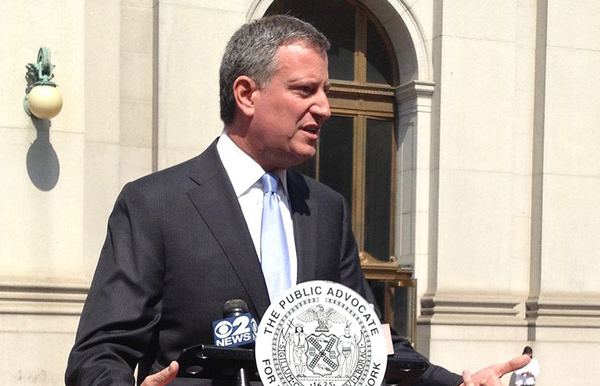
Photo by: PanchoS
With fingers fresh from the polling booths, I’m itching with policy proposals for our next mayor. I’m excited about the mayoral results and optimistic about the new direction he will take our city.
It is widely agreed upon that affordable housing needs immediate attention. Homeless families should receive top priority when applying for NYCHA apartments. We need a long-term housing subsidy program, such as Section 8, that will help families stay in their apartments. Our new mayor needs to take a close look at why families are stuck in shelter for years and to create sustainable, affordable housing opportunities.
As an advocate who works directly with homeless New Yorkers—constituents who also voted this week—and because I have eyes and ears on the frontlines of the shelter system, I’m posing some quick policy revisions that our new mayor can implement.
The far-reaching effects of these specific proposals would be massive for homeless families applying for and living in emergency shelter while the mayor addresses long term affordable housing options.
We need to look at the big picture, but while families are lining up at shelter intake centers right now, we must also address the immediate.
1) Post “Know Your Rights” posters and pamphlets at PATH and AFIC family intake centers.
Families arrive at intake centers with minimal knowledge of the shelter application process. Families are given different information on the process depending on the day and the worker. Often families are told that if they are turned down, they cannot reapply for a certain amount of time which is not true. Families can reapply at any time. Families are not informed of any way to get a copy of their file besides at a fair hearing even, though they may request it from the Department of Homeless Services (DHS)’s Records Department. Often, ineligible families are not informed of their right to a legal conference where they can meet with a DHS attorney to discuss their case. They are also often not told that they may bring a friend, advocate or relative to that legal conference. These are just a few examples. Families’ rights should be clear, consistent, and posted in the intake centers so families don’t have to rely on encountering a sympathetic worker to give them a full account of their rights.
2)PATH should not require the presence of school aged kids for reapplications.
Mr. Mayor-elect, you may not realize this, but homeless kids must be present for each and every reapplication their family submits at PATH. Reapplication is an all-day process. For many families, this means that students miss five to 10 days of school while PATH is finding their family ineligible every 10 days. In order to process an initial application, families must submit identifying documents such as birth certificates, Social Security cards and EBT cards. This information remains in families’ files, just as initial documentation submitted about their housing history, stays in families’ files for 90 days. So why is it necessary to pull kids out of school day after day just so they can sit in PATH while parents and security guards try to keep them from running in between the chairs?
3) Provide aid to families with pending fair hearings.
Workers at intake centers tell families who disagree with the agency’s determination that the family should request a fair hearing. This is not bad advice. However, until the DHS commissioner issues a decision after the fair hearing, families are often street homeless. Unlike pending food-stamp and public assistance fair hearings, there is no potential for aid to continue during the adjudication process. When a public assistance recipient requests a fair hearing in a timely manner, they have the option to receive aid to continue which allows their benefits to remain the same until the commissioner issues a decision. Homeless families appealing DHS’s application determination have no such option. We suggest that shelter continue to be provided to families contesting a decision. It’s not like you can get retroactive shelter the way you can get retroactive cash when you win a public assistance fair hearing. The nights families spend on train cars and in hospital rooms cannot be given back.
4) An external agency should conduct inspections of DHS shelters and cluster-sites.
Currently, DHS’s staff for Facility, Maintenance, and Development (FMD) conducts inspections of DHS and DHS contracted shelters. However, I know I am not alone in hearing horrific stories of broken boilers, roaches, bedbugs, and mold. I have experienced breathing and respiratory difficulties myself after visiting clients in their shelter units, despite the fact that families have included letters from their doctors in their numerous complaints to city agencies. We ask that an external agency, such as the City’s Department of Housing, Preservation, and Development (HPD), conduct these investigations. This would provide oversight of DHS facilities, especially when complaints of rodents and mold seem to fall on the deaf ears of DHS case managers and contracted agencies.
These are just a few of our suggestions to the incoming mayor. Implementing these policy changes will immediately help keep families off the streets and out of the emergency room, and keep students in school, while the city pursues long-term housing strategies.








